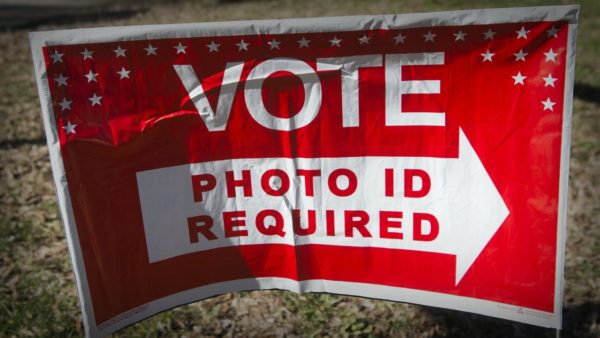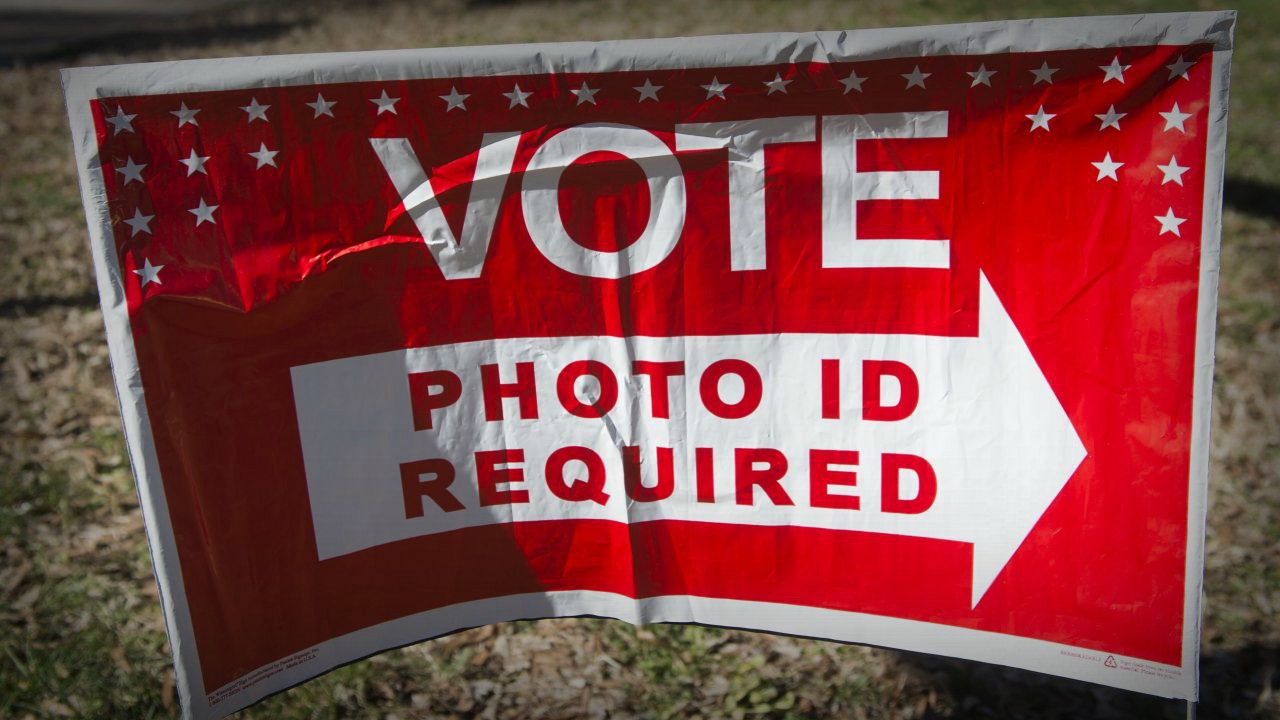
Image source: BillMoyers.com
On March 6th the trial deciding the validity of Kansas’ ‘documented proof of citizenship’ or DPOC law began [1]. The case Fish v. Kobach is seeking relief for plaintiffs who according to the ACLU, or the American Civil Liberties Union, were erroneously prevented from registering to vote under the DPOC law implemented in 2013 [2]. The complaint filed by the ACLU [3] dictates that since the implementation of the law, 14% of all individuals who have attempted to register to vote in the state have been placed on a suspense list for lacking documentation proving citizenship. Simply put, the voter ID laws are too strict.
Attorneys for the plaintiffs argue that the Kansas law violates provisions under the National Voter Registration Act (NVRA), which stipulates that a U.S. driver’s license serves as an application to participate in federal elections. The defendant, Kris Kobach, current Kansas Secretary of State and gubernatorial candidate; is serving in his official capacity as well as defense counsel. He also served as the vice chairman of the now-defunct Election Integrity Commission which was disbanded by the President on January 3, 2018. The commission was subject to near perennial litigation such as this and the costs began to outweigh the benefits, leading to its decommissioning [4].
The law in question is a piece of the 2011 Secure and Fair Elections Act (SAFE), which became active in 2013 [5]. Like gerrymandering, voter ID laws have long been a crucial point of political contention, dividing the nation almost exactly along party lines (no surprise there). Since its institution, the SAFE Act has led to the suspension of voter registrations of over 30,000 who have not submitted proof of citizenship; in addition, tens of thousands more have already been purged from voter databases entirely. When the ACLU initially filed the lawsuit in 2016 Judge Julie A. Robinson ruled that the legislation violated the NVRA and delivered a verdict favoring the plaintiffs [6]. The case has now been taken up on appeal and the state and nation await a verdict.
VENDETTA
The political vendetta underlying this debate is election security vs voter rights.
Election security hawks support voter ID laws due to the following:
- Voter fraud is endemic throughout US elections
- Illegal immigrants are unlawfully shifting US politics
- Unauthorized votes go exclusively to Democrats
Voters rights supporters oppose voter ID laws due to the following:
- These laws violate federal NVRA regulations
- Add more obstacles to minorities, middle, and working classes
- Unconstitutional due to the financial pressure it places on people
The nature of trial in the US already informs us of two possible outcomes. If the judge rules for the plaintiffs and reaffirms her previous 2016 ruling then the law will have to be either heavily amended or removed entirely. If she finds the defendant victorious, then the law remains. Conceivably, Kansas could pass a law that makes proof of citizenship a requirement for obtaining a driver’s license thereby circumventing federal law while simultaneously not being in violation.
If the plaintiffs emerge victoriously, then such a precedent will greatly impede the efforts of other states to create similar laws. If the defense succeeds then similar laws will undoubtedly become pervasive, and if Kansas should utilize the third option they would set a trend throughout Republican statehouses nationwide.
If Kansas and other states want their voter ID laws to survive litigation then they will have to utilize the third option and bypass federal law. The rationale behind DPOC laws albeit noticeably partisan does have a rational basis. The states that allow undocumented persons to procure driver’s licenses are the manifestation of what election security hawks deem pernicious to US elections: non-citizens or illegal immigrants playing a role in US politics. This draws a disconcerting parallel to the foreign influence investigations that are ubiquitous in the executive branch, regarding foreign actors shifting the outcome of elections.
Now, this poses another quandary: how do we classify a foreign actor? Someone who is overtly advocating for the benefit of a foreign entity? Or a foreign individual advocating on behalf of other foreign persons within the United States? We can safely assume the answer to that question will also be divided along party lines as well. In closing, I will pose another query: if citizens and non-citizens have the exact same set of rights and privileges, then what is the purpose of citizenship?
Take Action:
https://www.standunited.org/petition/protect-the-integrity-of-our-elections-by-passing-voter-id-laws – Do you believe US elections to be at severe risk to fraud? Join or start a petition here.
https://petitions.moveon.org/sign/tell-doj-to-block-discrimina- Think voter ID laws are obstructive and unjust? Sign this petition
https://law.justia.com/cases/federal/appellate-courts/ca10/16-3147/16-3147-2016-10-19.html – Want to track and review the history and outcomes of the Fish v. Kobach trial? Find it here.
https://www.whitehouse.gov/articles/presidential-advisory-commission-election-integrity/ – Examine the official executive order and function of the former Election Integrity Commission
References:
- “Fish v. Kobach”, Wikipedia, accessed March 25, 2018. https://en.wikipedia.org/wiki/Fish_v._Kobach
- “Fish v. Kobach”, American Civil Liberties Union, accessed March 25, 2018. https://www.aclu.org/cases/fish-v-kobach
- “Fish v. Kobach-Complaint”, American Civil Liberties Union, accessed March 25, 2018. https://www.aclu.org/legal-document/fish-v-kobach-complaint
- “Trump’s controversial election integrity commission is gone. Here’s what comes next.”, Washington Post, accessed March 25, 2018. https://www.washingtonpost.com/news/monkey-cage/wp/2018/01/04/trumps-controversial-election-integrity-commission-is-gone-heres-what-comes-next/?utm_term=.b4c1f804bec2
- “The New Kansas Voting Law-it’s just that easy”, Got Voter ID, accessed March 25, 2018. http://www.gotvoterid.com/
- “Voter Fraud Crusader Kris Kobach Takes His Case to Court, and to Kansas”, New York Times, accessed March 25, 2018. https://www.nytimes.com/2018/03/23/us/kris-kobach-kansas-governor.html




